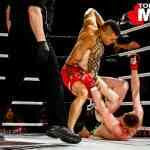Concussion Recovery Tips: Supplements, Vitamins & Techniques
Concussions. They’re going to happen. Whether your world is boxing, mixed martial arts, or another contact sport, at some point, you’re going to bump your noggin. Avoiding impact isn’t an option. Smarter choice of impact can help. But inevitably, invariably, you’re going to collide at one point and you’re going to incur head injury. The keys to success when it comes to minimizing the impact caused by concussions is understanding and preparation. Respond fast, then follow up with a wise protocol. Assuming you’ve incurred a concussion despite your best efforts, let’s examine techniques, vitamins and supplements you can use to lessen the damage delivered by a concussion.
Edwards vs Powers – Images courtesy of Rob Trudeau & TopMMANews.com
Techniques
First off – stop competing. If you’ve taken a headshot, you need to stop competing in your sport. You’re done for the day, even if your competitive spirit says otherwise. Continuing will only allow the damage to become worse. Immediately halt play and start rest. Seek medical attention. You’re likely having difficulty thinking, feeling slower, and lacking the ability to concentrate. A headache may appear, coupled with nausea and sensitivity to noise and light. You may feel irritable, sad, nervous and anxious. The top treatment will be peaceful rest, coupled with acetaminophen (Tylenol), not ibuprofen or aspirin (which increase your risk of bleeding). Yes, even after all we’ve achieved in technology as a species, a Tylenol and rest is still the top treatment for concussions!
Vitamins
Using vitamins can help your body enjoy the best environment for healing and recovery in the days or weeks after a concussion occurs. Vitamin B complex has long been used to help patients maintain proper brain function, and is also recommended for use following a concussion to quicken recovery. Two doses per day is ideal! Vitamin C (500 to 1000 mg per day) reduces any oxidative stress which can occur in the brain. Use 24IU of Vitamin E each day, as it will improve cognitive function and also serve as an anti-oxidant. Excessive use can cause bleeding. Finally, add magnesium, which has been proven to be scarce in the body following a head injury. Keeping those levels high ensures many of the standard body and brain functions can occur during this important time period.

Supplements
Aside from rest and Tylenol, you may also choose to use supplements to help the body repair and recover faster following an impactful injury. Protein (from whey/casein powder, or from foods) and Branched-Chain Amino Acids (BCAAs) are very useful for aiding muscle repair via protein synthesis. Omega 3’s and Fish oil have been used in the medical field to help patients recover from traumatic brain injury, and can also be used to help quicken your concussion recovery. Curcumin (turmeric extract) is a powerful anti-oxidant/anti-inflammatory which can also work to reduce brain swelling and allow for faster repair following injury resulting from concussion.
Keep your head on a swivel and your eyes open. Protect yourself. Avoid unnecessary risks. You’ll dodge most concussion opportunities. However, when they do happen, you should do everything possible to respond quickly with treatment, as well as supplementation to mitigate any long-term damage. Plenty of time and rest are essential, but you can boost recovery by using vitamins and supplements in a support role. Good luck, and stay safe!




